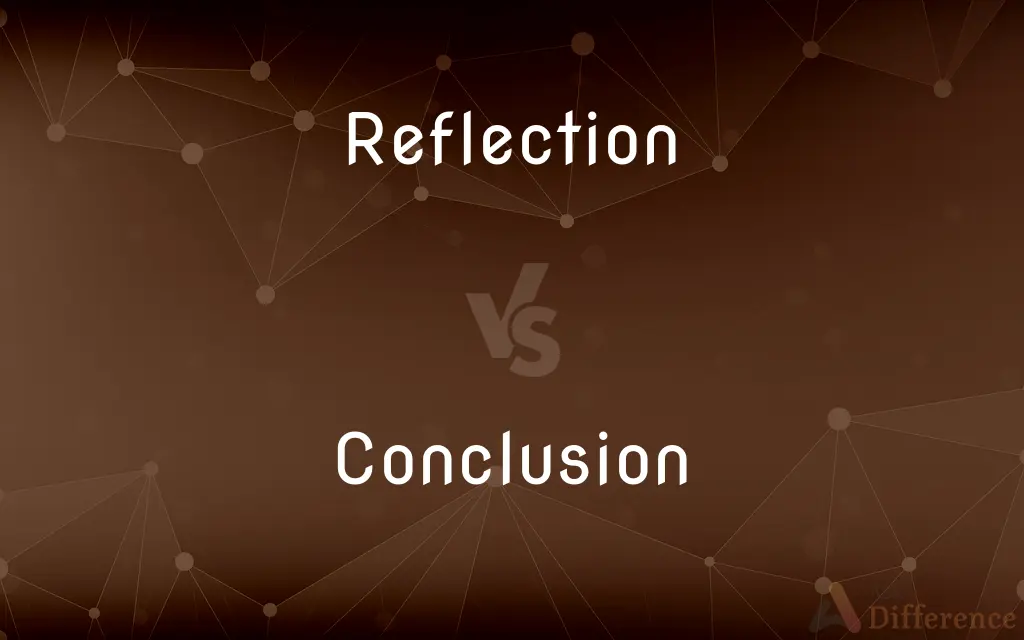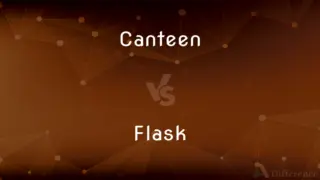Reflection vs. Conclusion — What's the Difference?
By Urooj Arif & Fiza Rafique — Updated on March 15, 2024
Reflection involves personal insights or critical thinking about a topic, while a conclusion is a final judgment or decision based on evidence.

Difference Between Reflection and Conclusion
Table of Contents
ADVERTISEMENT
Key Differences
Reflection often implies a process of introspection or thoughtful consideration, where one examines experiences, ideas, or events to gain deeper understanding. It involves analyzing one's thoughts, feelings, and actions in a certain context. On the other hand, a conclusion is typically the end point of an argument, discussion, or research, where evidence is synthesized to make a final statement or judgment.
In academic writing, a reflection might explore how certain concepts or experiences have impacted the writer's understanding or beliefs, allowing for personal growth or change. Whereas, a conclusion in the same context would summarize the main points made throughout the paper and clearly state what can be drawn from the discussion or study, often without introducing new information.
Reflections are subjective and can vary greatly from person to person, as they are based on individual experiences and perceptions. Conclusions, however, strive for objectivity, aiming to be universally accepted based on the evidence presented, regardless of personal opinion.
While reflections encourage open-ended exploration and can lead to more questions, conclusions aim to resolve the issue at hand, providing closure and clarity to the discourse. Reflections might not have a clear end, as they can lead to ongoing personal development, whereas conclusions signify the end of a discussion or analysis.
The tone in a reflection can be personal, explorative, and sometimes speculative, allowing for a range of emotions and thoughts. In contrast, the tone of a conclusion is usually more formal, definitive, and focused on summarizing and resolving.
ADVERTISEMENT
Comparison Chart
Purpose
To explore and analyze personal thoughts and experiences
To summarize and make a final judgment or statement
Nature
Subjective and introspective
Objective and summarizing
Outcome
Personal insights and potential growth
Final judgment or resolution of a discussion
Tone
Personal, explorative, speculative
Formal, definitive, summarizing
Usage
In personal development, education, and therapy
In academic writing, debates, and decision-making processes
Compare with Definitions
Reflection
A process of introspective thinking and analysis about one's experiences, thoughts, and feelings.
Her reflection on the project's challenges led to significant personal growth.
Conclusion
A final judgment or decision reached by reasoning.
The conclusion of the study was that the new treatment was effective.
Reflection
Reflection can also refer to the act of mirroring or representing something.
The painting was a vivid reflection of the artist's emotional state.
Conclusion
The last part of something, typically a speech or piece of writing.
The conclusion of her speech emphasized unity and perseverance.
Reflection
It can denote careful or long consideration of a subject.
After much reflection, she decided to change her career path.
Conclusion
It can indicate the end or finish of an event or process.
The conclusion of the festival was marked by a spectacular fireworks display.
Reflection
In physics, reflection is the throwing back of light, sound, or heat by a surface.
The reflection of sunlight off the snow was blinding.
Conclusion
In logic, a conclusion is a proposition concluded or inferred from the premises given.
The conclusion was inevitable, given the two preceding arguments.
Reflection
Reflection also refers to an image seen in a mirror or shiny surface.
He adjusted his tie using his reflection in the window.
Conclusion
Conclusion can also imply a resolution or agreement reached after consideration.
The board meeting came to a conclusion on the new policy direction.
Reflection
The act of reflecting or the state of being reflected.
Conclusion
The close or last part; the end or finish
The conclusion of the festivities.
Reflection
Something, such as light, radiant heat, sound, or an image, that is reflected.
Conclusion
The result or outcome of an act or process
What was the conclusion of all these efforts?.
Reflection
Serious thinking or careful consideration
Engaged in reflection on the problem.
Conclusion
A judgment or decision reached after deliberation.
Reflection
A thought or an opinion resulting from such thinking or consideration
Wrote down her reflections.
Conclusion
A final arrangement or settlement, as of a treaty.
Reflection
An indirect expression of censure or discredit
A reflection on his integrity.
Conclusion
(Law) The formal closing of a legal complaint or pleading.
Reflection
A manifestation or result
Her achievements are a reflection of her courage.
Conclusion
A proposition that follows from the premises of a formal proof, for instance from the major and minor premises of a syllogism.
Reflection
The folding of a membrane from the wall of a cavity over an organ and back to the wall.
Conclusion
The proposition concluded from one or more premises; a deduction.
Reflection
The folds so made.
Conclusion
The end, finish, close or last part of something.
Reflection
The act of reflecting or the state of being reflected.
Conclusion
The outcome or result of a process or act.
Reflection
The property of a propagated wave being thrown back from a surface (such as a mirror).
Conclusion
A decision reached after careful thought.
The board has come to the conclusion that the proposed takeover would not be in the interest of our shareholders.
Reflection
Something, such as an image, that is reflected.
The dog barked at his own reflection in the mirror.
Conclusion
(logic) In an argument or syllogism, the proposition that follows as a necessary consequence of the premises.
Reflection
Careful thought or consideration.
After careful reflection, I have decided not to vote for that proposition.
Conclusion
(obsolete) An experiment, or something from which a conclusion may be drawn.
Reflection
An implied criticism.
It is a reflection on his character that he never came back to see them.
Conclusion
(law) The end or close of a pleading, for example, the formal ending of an indictment, "against the peace", etc.
Reflection
(computing) The process or mechanism of determining the capabilities of an object at run-time.
Conclusion
(law) An estoppel or bar by which a person is held to a particular position.
Reflection
(anatomy) The folding of a part; a fold.
Conclusion
The last part of anything; close; termination; end.
A fluorish of trumpets announced the conclusion of the contest.
Reflection
The act of reflecting, or turning or sending back, or the state of being reflected.
The eye sees not itself,But by reflection, by some other things.
Conclusion
Final decision; determination; result.
And the conclusion is, she shall be thine.
Reflection
The reverting of the mind to that which has already occupied it; continued consideration; meditation; contemplation; hence, also, that operation or power of the mind by which it is conscious of its own acts or states; the capacity for judging rationally, especially in view of a moral rule or standard.
By reflection, . . . I would be understood to mean, that notice which the mind takes of its own operations, and the manner of them, by reason whereof there come to be ideas of these operations in the understanding.
This delight grows and improves under thought and reflection.
Conclusion
Any inference or result of reasoning.
Reflection
Shining; brightness, as of the sun.
Conclusion
The inferred proposition of a syllogism; the necessary consequence of the conditions asserted in two related propositions called premises. See Syllogism.
He granted him both the major and minor, but denied him the conclusion.
Reflection
That which is produced by reflection.
As the sun water we can bear,Yet not the sun, but his reflection, there.
Conclusion
Drawing of inferences.
Your wife Octavia, with her modest eyesAnd still conclusion.
Reflection
A part reflected, or turned back, at an angle; as, the reflection of a membrane.
Job's reflections on his once flourishing estate did at the same time afflict and encourage him.
Conclusion
An experiment, or something from which a conclusion may be drawn.
We practice likewise all conclusions of grafting and inoculating.
Reflection
Censure; reproach cast.
He died; and oh! may no reflection shedIts poisonous venom on the royal dead.
Conclusion
The end or close of a pleading, e.g., the formal ending of an indictment, "against the peace," etc.
Like the famous ape,To try conclusions, in the basket creep.
Reflection
The transference of an excitement from one nerve fiber to another by means of the nerve cells, as in reflex action. See Reflex action, under Reflex.
Conclusion
A position or opinion or judgment reached after consideration;
A decision unfavorable to the opposition
His conclusion took the evidence into account
Satisfied with the panel's determination
Reflection
A calm lengthy intent consideration
Conclusion
An intuitive assumption;
Jump to a conclusion
Reflection
The phenomenon of a propagating wave (light or sound) being thrown back from a surface
Conclusion
The temporal end; the concluding time;
The stopping point of each round was signaled by a bell
The market was up at the finish
They were playing better at the close of the season
Reflection
Expression without words;
Tears are an expression of grief
The pulse is a reflection of the heart's condition
Conclusion
Event whose occurrence ends something;
His death marked the ending of an era
When these final episodes are broadcast it will be the finish of the show
Reflection
The image of something as reflected by a mirror (or other reflective material);
He studied his reflection in the mirror
Conclusion
The proposition arrived at by logical reasoning (such as the proposition that must follow from the major and minor premises of a syllogism)
Reflection
A likeness in which left and right are reversed
Conclusion
The act of ending something;
The termination of the agreement
Reflection
(mathematics) a transformation in which the direction of one axis is reversed
Conclusion
A final settlement;
The conclusion of a business deal
The conclusion of the peace treaty
Reflection
A remark expressing careful consideration
Conclusion
The last section of a communication;
In conclusion I want to say...
Reflection
The ability to reflect beams or rays
Conclusion
The act of making up your mind about something;
The burden of decision was his
He drew his conclusions quickly
Common Curiosities
Can a conclusion be subjective?
While conclusions aim for objectivity, they can sometimes reflect the writer's or researcher's interpretation of the evidence.
What is the main difference between reflection and conclusion?
Reflection is about exploring personal insights and experiences, while a conclusion summarizes and resolves discussions based on evidence.
Is reflection always personal?
While reflection is often personal, it can also involve considering broader ideas, events, or theories critically.
How can reflection impact decision-making?
Reflection can provide deeper insights and alternative perspectives, leading to more informed and thoughtful decisions.
What makes a strong conclusion in an argument?
A strong conclusion clearly summarizes the key points, addresses the main argument, and leaves a lasting impression on the reader.
Can a reflection lead to a conclusion?
Yes, reflection can lead to personal conclusions or insights, but these are distinct from formal conclusions in academic or professional contexts.
Is it necessary to include both reflection and conclusion in an academic paper?
It depends on the assignment's requirements. Some papers, especially reflective essays, may emphasize personal reflection, while others focus on drawing conclusions from research.
How does the purpose of a conclusion differ in academic writing and everyday decisions?
In academic writing, a conclusion summarizes evidence and research findings, while in everyday decisions, it often represents a final choice or judgment.
Why is reflection important in learning?
Reflection helps learners integrate new information with existing knowledge, enhancing understanding and personal growth.
Can the process of reflection change one's initial conclusion?
Yes, reflecting on additional information or perspectives can lead to the reevaluation and modification of initial conclusions.
What role does personal bias play in reflection and conclusion?
Personal bias can influence both reflection and conclusion, but awareness and critical thinking can help mitigate its impact.
Are there cultural differences in how reflections and conclusions are expressed?
Yes, cultural contexts can influence the style, tone, and format in which reflections and conclusions are communicated.
How can one ensure their conclusion is well-supported?
By basing the conclusion on carefully analyzed evidence and logically connecting it to the main points discussed.
Can a conclusion be open-ended?
While conclusions typically provide closure, some may suggest further research or acknowledge unresolved questions.
How does the audience affect the presentation of reflections and conclusions?
The audience's expectations and background knowledge can shape how reflections and conclusions are articulated and received.
Share Your Discovery

Previous Comparison
Canteen vs. Flask
Next Comparison
Pillar vs. PoleAuthor Spotlight
Written by
Urooj ArifUrooj is a skilled content writer at Ask Difference, known for her exceptional ability to simplify complex topics into engaging and informative content. With a passion for research and a flair for clear, concise writing, she consistently delivers articles that resonate with our diverse audience.
Co-written by
Fiza RafiqueFiza Rafique is a skilled content writer at AskDifference.com, where she meticulously refines and enhances written pieces. Drawing from her vast editorial expertise, Fiza ensures clarity, accuracy, and precision in every article. Passionate about language, she continually seeks to elevate the quality of content for readers worldwide.















































